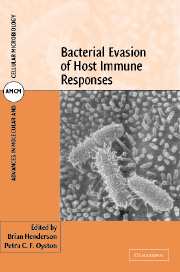
-
Select format
-
- Publisher:
- Cambridge University Press
- Publication date:
- August 2009
- April 2003
- ISBN:
- 9780511546266
- 9780521801737
- Dimensions:
- (228 x 152 mm)
- Weight & Pages:
- 0.723kg, 328 Pages
- Dimensions:
- Weight & Pages:
You may already have access via personal or institutional login
Book description
Our survival as multicellular organisms requires the constant surveillance of our internal and external (mucosal) environments by the multifarious elements of the innate and acquired systems of immunity. The objective of this surveillance, expensive as it is to the organisms, is to recognise and kill invading microorganisms. Over the past fifty years the cells and mediators involved in our immune defences have been painstakingly identified. However, it is only relatively recently that the ability of microorganisms to evade immunity has been recognised and investigated. Bacterial Evasion of Host Immune Responses introduces the reader to the mechanisms used by bacteria to evade both humoral and cellular immune responses, using systems ranging in complexity from the simple quorum sensing molecules - acyl homoserine lactones - to the supramolecular syringe-like devices of type III secretion systems. This book will be of interest to researchers and graduate students in microbiology, immunology, pharmacology and molecular medicine.
Contents
Metrics
Full text views
Full text views help Loading metrics...
Loading metrics...
* Views captured on Cambridge Core between #date#. This data will be updated every 24 hours.
Usage data cannot currently be displayed.
Accessibility standard: Unknown
Why this information is here
This section outlines the accessibility features of this content - including support for screen readers, full keyboard navigation and high-contrast display options. This may not be relevant for you.
Accessibility Information
Accessibility compliance for the PDF of this book is currently unknown and may be updated in the future.


